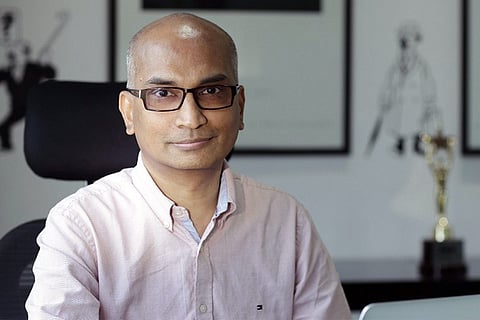

Even as film industries across the world have been plunged into gloom, with shootings cancelled and theatres closed owing to the coronavirus pandemic, V Senthil Kumar of Qube Cinemas had something to cheer for on Wednesday.
The co-founder of the Chennai-based end-to-end digital cinema technology and solutions company is one among the 819 people from around the world invited to be a member of the Academy of Motion Pictures.
Speaking to TNM, Senthil says that the news was a total surprise to him.
“I’m very thrilled and happy. The process for how nominations works internally and how they select members is not something I know yet. Maybe I’ll do some research to figure out how! I just woke up this morning and there was an email inviting me to join. And shortly after that, there was a press release in Variety,” he says.
Senthil is not absolutely sure but he’s likely to be the first person from the technology and business side of the Indian film industries to be invited. He is in the Members-At-Large category. While it’s common knowledge that members vote for the different categories of the Academy’s Oscar Awards every year, they’re also involved in other ways.
“The Academy’s purpose is more than just the awards. They’re most famous for it, but there’s a lot more they do when it comes to the art and science of cinema,” Senthil says.
He continues, “For example, when the move to digital cinema was happening, they were the ones who did testing with people who had very good eyesight, cinematographers and directors, to see what was the level of quality required to move to digital.”
Senthil adds that the Academy does a lot of research into the technology behind the art of cinema.
“For example, they need a standard for how colour can be handled. The way everybody perceives colour is different, and we have a technical weight for how that colour is actually represented in numbers when we move to digital. They worked on a way to ensure that it’s (the colour) always accurate whether you’re watching the film on TV, big screen, digital or film print,” he says.
The Academy consults its members in such research, too, and this is where Qube’s expertise could come in handy. Senthil feels that the invite is a great recognition of Qube’s contribution to cinema. “I don’t think there’s a full understanding within India of what all we do as a company. Some see us as a company that puts equipment in theatres. Only five companies in the world have this technology. Others see us as an advertising company that sells advertising for theatres,” he says.
However, Qube, which was established in 1986, has been nothing short of a pioneer in the field of cinema technology. Qube was the company that helped India move from film-based editing to digital editing, Senthil says.
“We also moved India from mono analog sound to digital sound directly by bringing in DTS (sound system). When we saw that there was a potential to bring digital cinema to India, we built equipment from scratch rather than bring in foreign technology. This was much before Make in India, Buy Local, and all these slogans. We built a product that went to different countries in the world. It’s in use in about 50 countries. That understanding of our deep technology background is there in some parts of the industry but not everybody knows it,” he says.
Though the Academy is trying to increase its diversity by inviting more non-white persons, the list from India has been Bollywood-centric every year.
Agreeing with this, Senthil says, “I don’t like the term Bollywood itself, because it’s a unique industry in its own right and not an extension of Hollywood. And even worse is that nobody knows there’s such a large and very diverse industry in the south and the east. People don’t even know that in Mumbai itself there’s such a good Marathi industry. There’s a lack of awareness about the diversity of India’s movie industries outside the country. I hope I can help increase awareness about this.”
Like several other companies, Qube too has been hit badly by the coronavirus pandemic and the lockdown.
“It’s affected us very, very badly. We’ve had zero revenue. All of our revenue comes from movies releasing in theatres, advertising along with that movie, as well as rentals from theatres. Clearly, theatres won’t be able to pay us rentals and the other revenue streams have stopped. We’ve a huge infrastructure cost in our company. We’ve had to cut everybody’s pay by half or more... we’ve also had to do some reduction in jobs. It’s something I never dreamed we’d have to do in the 30 years that we’ve been around,” he says.
Senthil hopes that the theatres will open at least by Deepavali time, though he’s not very optimistic. But is this the end of cinema as we know it? The co-founder of Qube says it is not so – people love the theatre experience too much for a virus to extinguish it forever.